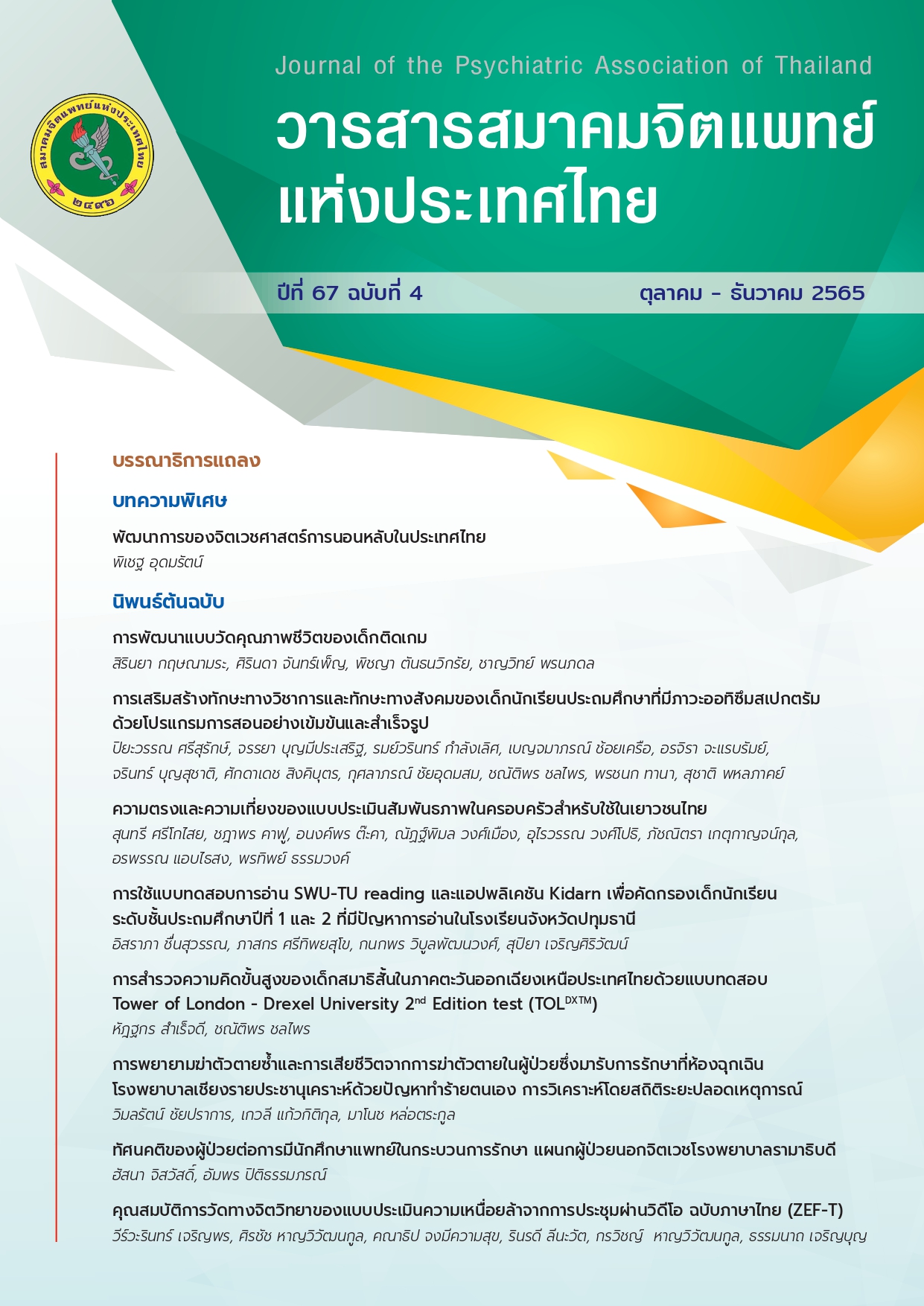The The Validity and Reliability of the Brief Family Relationship Scale (BFRS) for Applying in Thai Youth The psychometric properties of the Brief Family Relationship Scale (BFRS) for Applying in Thai Youth
Main Article Content
Abstract
Objective: To examine the psychometric properties of the Brief Family Relationship Scale (BFRS) for applying in Thai youth -Thai version.
Methods: The instrument development research was conducted based on the original scale with 19 items in two phases. It’s a Likert scale with 4 answer choices. Phase 1 encompassed the scale translation and readability testing of each question. Phase 2 included evaluation of the BFRS psychometric properties through field-testing with 201 Thai youth 11 - 18 years old in North, Central, South, and North-East using: 1) items analysis, 2) power of discrimination by technique 25%, 3) construct validity through exploratory factor analysis and confirmatory factor analysis, and convergent validity, and 4) reliability coefficient alpha of Cronbach.
Results: Overall, good item discrimination power was shown for all nineteen items. There were 19 items that had an item-total correlation of at least 0.4 (r ≥ 0.4). Reliability analysis showed a Cronbach’s alpha coefficient of 0.89. Exploratory factor analysis revealed three components with eigen-value more than 1: family cohesion, family expressiveness, and family conflict. The nineteen items had factor loadings ranking from 0.51 to 0.82, and displayed a total variance of 52.7%. Confirmatory factor analysis revealed that the model of cohesion, expressiveness, and conflict were relevant to the empirical data (χ2= 71.74, df = 110, GFI = 0.97, AGFI = 0.94, RMSEA =0.000). Convergent validity between the BFRS and the Chulalongkorn Family Inventory (CFI) showed high correlation coefficient (r = 0.85, p < .001).
Conclusion: The BFRS has high construct validity and high reliability. Therefore, the BFRS can be used as a scale of family relationship assessment in Thai youth.
Article Details

This work is licensed under a Creative Commons Attribution-NonCommercial-NoDerivatives 4.0 International License.
Articles submitted for consideration must not have been previously published or accepted for publication in any other journal, and must not be under review by any other journal.
References
Tumka K, Kongdang K, Suksatan W. Mental health and family relationship of nursing students after the practice in nursing. JNH SSRU 2018;1:111-24.
Jirangnimitsakul P, Wongkumsin T. Family relationship, moral quotient, coping strategies and psychological well-being of high school students of extra-large sized school at Surat Thani Province. JSHRA 2020;26:169-91
Rienpradub S. The relationship between adversity quotient and family relation of supporting personnel in King Mongkut’s university of technology north Bangkok. Panyapiwat Journal 2020;12:149-59.
Tossaphornphitakkun N, Sawangsopakul B. Effects of cardiovascular disease on physical and mental health of patients in Sirindhorn Cardiac Center at Phramongkutklao Hospital. JCDLQ 2020;8:592-602.
Muangmakham S, Skulphan S, Sethabouppha H. Family relationships and suicidal risks of clients receiving services at mental health and psychiatric clinic. Nursing Journal 2020;47:240-52.
The Family Intervention Clinic, Rajanagarindra Institute of Child Development. Medical records of service recipients for fiscal year 2018-2020. Rajanagarindra Institute of Child Development; 2020.
Srikosai S, Peangjai K. A comparison of mental health status of parents of autistic children and parents of Thai ADHD children. Proceedings of the 1st Child and Adolescent Psychiatry Symposium; 2018 Feb 7-8; Chiang Mai; 2018.
Child and adolescent psychiatric ward, Rajanagarindra Institute of Child Development. The case formulation of patients in child and adolescent psychiatric ward. Rajanagarindra Institute of Child Development; 2020.
Thanasuk J, Somprasert C, Sinsiri C. The effects of a therapeutic relationship program for caregivers of patients with stroke on family relationships. JRTAN 2018;19(supplement):98-107.
Burns N, Grove SK. The practice of nursing research: conduct, critique, & utilization. 4th ed. Philadelphia: W.B. Saunders; 2001.
Devellis RF. Scale development: Theory and applications. 2nd ed. Thousand Oaks: SAGE; 2003.
Waltz CF, Strickland OL, Lenz ER. Measurement in nursing and health research. 3rd ed. New York:Springer; 2005.
Nupath V, Deorisres W, Wacharasin C. Effects of a family therapeutic conversation program on family relationship, adolescents self-care behaviors and family care behaviors of adolescents with hyperventilation syndrome. JFONUBUU 2014; 22:50-60.
Fok CC, Allen TJ, Henry D, People Awakening Team. The brief family relationship scale: A brief measure of the relationship dimension in family functioning. Assessment 2014;21:67–72.
Moos RH, Moos BS. Family environment scale manual. 3rd ed. Palo Alto, CA: Consulting Psychologists; 1994.
Philip J, Ford T, Henry D, Rasmus S, Allen J. Relationship of social network to protective factors in suicide and alcohol use disorder intervention for rural Yup’ik Alaska native youth. Psychosoc Interv 2016;25:45-54.
Nadler JT, Weston R, Voyles EC. Stuck in the middle: The use and interpretation of mod-points in items on questionnaires. J Gen Psychol 2015;142:71–89.
Trangkasombat U. Psychotherapy and family counseling. 6th ed. Bangkok: Santa Publishers; 2011.
Hair JF, Black WC, Babin BJ, Anderson RE, Tatham RL. Multivariate data analysis. 6th ed. New Jersey: Pearson Prentice Hall; 2006.
Kaewkaewpan W. Family relationships with problem of delinquency in adolescence. Veridian-E-Journal, Silpakorn University 2017;10:361-71.


